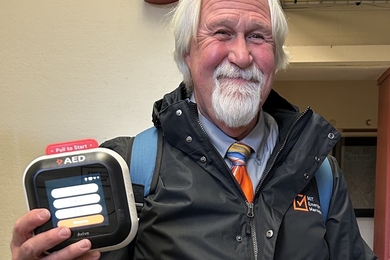Pesticide was sprayed from roadways on campus from 12:30-1am Thursday to eradicate mosquitoes that might carry the West Nile Virus.
It was part of a citywide spraying program along open spaces and roads in Cambridge, done by the East Middlesex Mosquito Control Project (EMCP) at the city's request. Resmethrin, a pesticide that is approved by federal and state agencies, was dispersed through a nozzle mounted on the back of a truck.
"The Facilities, Residence Life and Campus Police departments worked closely with EPO on short notice to prepare MIT for the spraying," said Jamie Lewis Keith, Senior Counsel and managing director for Environmental Programs and Risk Management.
MIT's Environmental Programs Office (EPO) arranged with the EMCP for an EPO staff member to escort Cambridge officials and the truck to ensure that spraying was not done near air intakes in buildings where research using sensitive insects or invertebrates takes place. EPO staff worked closely with faculty and researchers on Wednesday to prepare for the spraying.
Working on short notice, Ms. Keith notified Academic Council, Administrative Council, Faculty Council and administrative officers across the Institute Wednesday. "It is important to alert the community as early as possible of events such as the mosquito spraying so that emergencies and problems can be avoided," Ms. Keith said. "This is part of our commitment to service for the MIT community."
Resmethrin, a synthetic, is similar to a natural pesticide produced by chrysanthemums. David Henley, superintendent of the EMCP, said a low concentration of a half ounce per acre of a soy bean oil and Resmethrin mixture was used. Of this mixture, only 3/1,000th of a pound per acre was Resmethrin.
It breaks down within hours when exposed to light or water, and is then no longer irritating. According to the Cambridge Public Health Department and Dr. David Diamond of the MIT Medical Department, short-term exposure to Resmethrin at this low concentration does not pose adverse health effects.
Most people, even if they are accidentally exposed, do not develop any symptoms. Some people may experience short-term symptoms, including eye, nose, throat or skin irritation if exposure occurs during spraying or a person touches exposed outdoor surfaces within a few hours of spraying.
Day care facilities at MIT did not use outdoor equipment on Thursday until noon. As an extra precaution, the equipment was hosed down with fresh water by 8am. In addition, benches, tables, barbecues and other horizontal surfaces on campus were hosed down.
The Medical Department received five calls for information about the spraying. No one was treated.
Dead crows infected with the West Nile Virus that is carried by mosquitoes have been found in Boston and Brookline, within two miles of much of Cambridge, including MIT's campus. In addition, mosquito carriers were found in Brookline.
For additional information about the spraying, copies of the city's fact sheet are available at MIT Medical and at the front desk of all MIT residences. Copies of the MSDS for Resmethrin are available from Bill Van Schalkwyk at billv@mit.edu or x3-9492. Dr. Diamond may be reached at diam@med.mit.edu.
A version of this article appeared in MIT Tech Talk on August 23, 2000.





